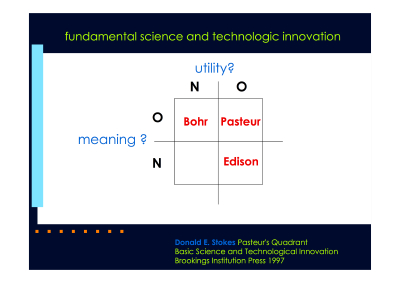
|
| home page |
| media |
| research |
| vision |
| metabolic bioremediation |
| publications |
| lectures |
OUR VALUES |
|
To understand and solve, share, foresee AMAbiotics SAS is a company developing research. While this brief statement is self-explanatory it may be useful to outline its context. The "general public", to which by definition we belong, is motivated by two general forces: on the one hand by curiosity — man is driven by an insatiable curiosity as celebrated by Rudyard Kipling — and on the other hand, by his quest for well-being. There is no contradiction here: curiosity nourishes the part of dream which occupies our minds, and it allows us to make the discoveries that contribute to our well-being. The deepest misunderstandings about research that plague most human societies derive from the mistaken but widely spread assumption that it suffices to want (or simply wish) to obtain the objects of our desires. Yet, desiring is certainly not enough, because, by its very nature, discovery is unpredictable. If it were enough to want something, there would be nothing to discover, but simply the need for orientating the natural course of things in the right direction. We all know that this is an impossible dream (which would destroy any interest in discovery anyway). This is exactly what Louis Pasteur understood: it is
essential to take the social demand into account, to be
driven by the motivation of the people we live
with. Yet this must not mean that this motivation, by
itself, is enough to lead to discovery. The role of a
motivation is simply to allow one to choose between the
many paths that are offered to our minds. The
possibilities for novel knowledge are without any
limitation. And once a motivated path is chosen, it
needs to be explored with the
scientific method, which is the only way to be
sure that it will lead to discoveries.
For example, we know that wine and beer, from time to time, become sour. This happens without known causes, and this asks a question. Some correlations have been observed with a variety of phenomena, but correlations are not causes. Can we use this observation to understand the causes of the process? Silkworms are suddenly dying from a terrible disease that drives all the workers in the silk factories of southern France to unemployment. The governement calls Louis Pasteur for help, as he has solved the riddle of the diseases of beer and wine, creating from this very practical motivation the bases of modern microbiology... Motivation asks a question. The question leads to conceptual and experimental research, of the very same type as that performed by pure academic research. And as a consequence it produces discoveries. Exactly what research is meant to do. The fate of these discoveries is of two types. First they serve as bases for the creation of the general knowledge that is used to progressively build up our common knowledge. Second, it leads to applications that may be used by the world of industry, fulfilling public demands and providing work for the people. The study of the diseases of beer and wine, beside being at the forefront of the creation of a whole scientific discipline, microbiology, led to processes that are still in use today, in particular in the various industrial processes used to produce beer and other fermentations. This way expresses the general background of our values and our business model. We start from general and widespread demands, and, as a start point, from the hardships endured by patients submitted to long term medical treatments — but we may also be driven to work on the quality of our environment, soil and water in particular, which are also enduring harsh treatments — and we try and understand the metabolic alterations that go in parallel with these situations. This allows us to discover novel metabolic pathways and novel interactions. Using this knowledge, which we will make public, we can derive applications, that will naturally be protected by intellectual property rights needed for the functioning of the company and for the work of its employees. As can be seen, this win-win model, allows us to build up an harmonious collaboration with the academic world, as academy — with creation of novel knowledge — and industry — with creation of effective applications — both find their interest in our work. This model, finally, because of its deep roots into social demand, poses from its very beginning the ethical, safety and security questions that should be compelling for all. Indeed we, too, belong to the general public, and our concerns are the same as those of everybody. We thus participate to an intellectual intelligence that is too often absent from academic research, leading to deep misunderstandings about technology-driven research in biology. Misunderstandings that led to real sufferings in our societies, whether in its imagination, or in the wrong usage of our common resources, the limits of which we are now all aware of. |
This text has been published in Ludus Vitalis with small modifications.
Louis Pasteur
Etudes sur la bière, ses maladies, causes
qui les provoquent, procédé pour la rendre inaltérable, avec une
Théorie Nouvelle de la Fermentation.
Gauthier-Villars, Paris, 1876.Translated
by Frank Faulkner: The Diseases
of Beer, Their Causes, and the Means of Preventing Them
MacMillan & Company, 1879
|
science and
society |
